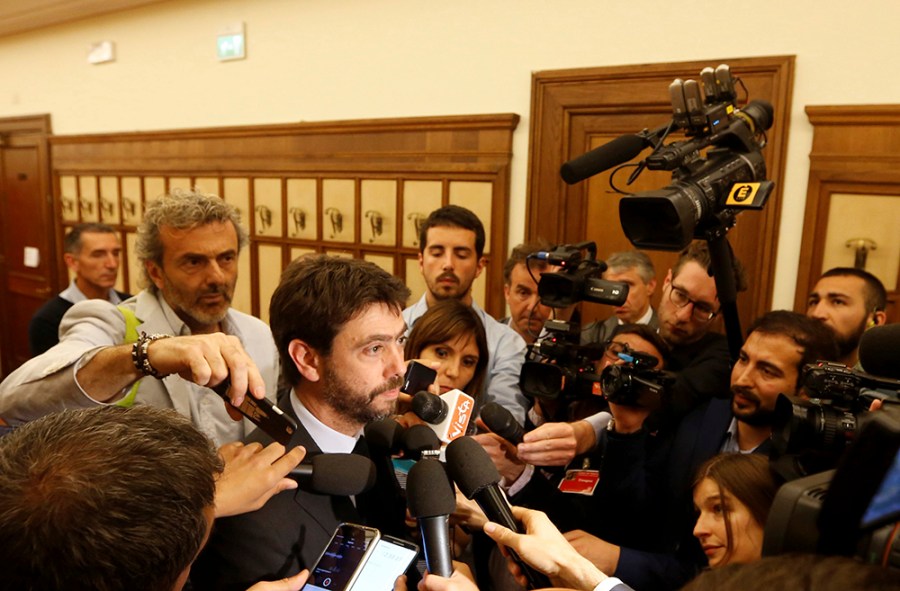Twenty-seven per cent of AS Roma season ticket holders have a criminal record. The man to make this remarkable statement is Italian Police Chief, Prefect Franco Gabrielli, during a hearing with Italy’s parliamentary anti-mafia commission last May. In that same hearing, Prefect Gabrielli also said something that has long been contended by those who investigate Italian organised crime:
“For more than 15 years now, we have been aware that the football industry is exposed to interference from both organised crime and everyday crooks. We have documented several cases of contiguity and overlapping between criminal groups and sports clubs, footballers and the professional world of football.
“The thing is that the criminal world sees in the football economy an opportunity to increase illegal (money) trafficking as well as to insinuate itself in a very pervasive way into the social framework…”
Gabrielli was making these remarks in the context of the anti-mafia commission’s ongoing investigation into the levels of mafia infiltration in Italian football. Thus far, police chief Gabrielli, Juventus President Andrea Agnelli, Lazio President Claudio Lotito, Napoli President Aurelio De Laurentis, Genoa boss Enrico Preziosi, Juventus lawyer, Luigi Chiappero, Football Federation investigator, Giuseppe Pecorelli as well as public prosecutors from Turin and Naples have been just some of the many important figures to give testimony to the Commission. Oftimes, too, their testimony has been so “delicate” that it has been given behind closed doors.
The most “spectacular” (in media terms) aspect of these hearings has, obviously, been linked to the Old Lady, champions Juventus. This story began four years ago when the Public Prosecutor’s Office in Turin opened an investigation (Alto Piemonte) into the infiltration of the n’Drangheta (Calabrian mafia) into North Western Italy. In the course of their enquiry, investigators discovered, by chance, that the Old Lady herself may well have been infiltrated by what is now modern Italy’s most powerful and aggressive organised crime unit, namely the n’Drangheta.
It appears that, via contacts with hardline Ultra fans, N’Dranghetisti were able to purchase season and match tickets, subsequently sold on the ticket-tout market in a business worth maybe an annual €1 million. The logic behind these sales was clearly the unwritten “pact” – namely, tickets for the Ultra in return for peace and quiet (hence no UEFA bans) at the stadium.
Not surprisingly, Juventus President Andrea Agnelli has repeatedly denied meeting with mafia bosses to sell them tickets, as had been claimed by some media sources. At the end of last March, he said:
“As I said a few days ago, I have never met mafia bosses. At regular intervals, as you know, I meet with all kinds of different fans, whether they’re ticket-holders or members ultras… Ultra groups are powerful and often have close ties with clubs.
“This is done in the full light of day and remains an integral part of a president’s role at a football club…If some of these people are now regarded differently by the law, this is something which, at the time, was known neither by me nor by or any Juventus staff…”
The “now regarded differently” remark is a reference to Rocco Dominello, member of an n’Drangheta family who allegedly met with Juventus officials (and also with Andrea Agnelli) in relation to tickets at a time when he was not under investigation for mafia-related crime. At the Alto Piemonte trial in Turin last week, however, Rocco Dominello received a seven year and nine months prison sentence for “Ticket Touting”.
Clearly, this story will run and run. For one thing, defence lawyers at the Alto Piemonte trial have indicated that they will appeal last week’s sentences. For a second, the ongoing paralell Federation investigation into the Juventus-n’Drangheta connection will be issuing its judgement next September, as they look into the accusation that Juventus have been engaged in “illegal” ticket sales.
In the meantime, there remains the puzzling story of Juventus ultra fan, Raffaelo Bucci, who killed himself by jumping off an autostrada viaduct outside Turin last July. Ironically, the day prior to his death, Bucci had testified to the Turin magistrates within the ambit of their n’Drangheta investigation. Did he really commit suicide? Last week, Rocco Dominello told the Turin court that he collected his tickets from Bucci, saying:
“I always had to pass through him…”
One thing that seems to emerge clearly from the anti-mafia commission’s work is that the Juventus case is almost certainly the very tip of the iceberg. The commission President, Rosy Bindi, has already gone on record to say that there exists “the very real problem” of a “grey-zone” relationship between clubs and organised crime, often local organised crime, in relation to ticket sales, adding:
“The whole point of this investigation into the mafia (and football) is, above all, to make everyone aware of the risks that both ignorance of and underestimation of the mafia phenomenon comport…”







